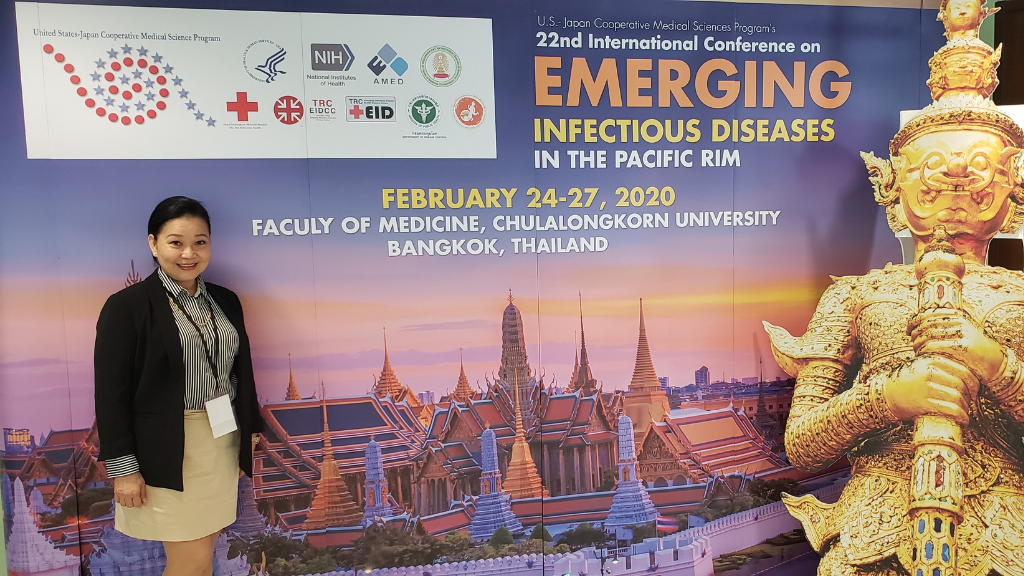Running a Conference on Emerging Infectious Diseases – At the Start of a Pandemic

February 24-27, 2020, scientists and government officials from around the world gathered – online and in-person – to attend the 22nd International Conference on Emerging Infectious Diseases in the Pacific Rim at the Faculty of Medicine Chulalongkorn University in Bangkok, Thailand. When CRDF Global Travel & Logistics Specialist Adam Coe began planning for the event in October 2019, he had no idea just how pertinent it would be. “At first, we didn’t fully realize the potential of what was coming out of Wuhan, China. Once it became apparent that COVID-19 was not going away but growing internationally, we began to see more questions from the travelers on safety and security,” he says.
Each year, the conference gathers experts from renowned health institutions such as the National Institute of Allergy and Infectious Diseases (NIAID), which is led by Dr. Anthony Fauci, and the Ministry of Public Health Department of Disease Control (DDC) in Thailand to collaborate on research findings surrounding emerging diseases. As word of the novel coronavirus began to break headlines around the world however, it was clear adjustments would be necessary to make sure this year’s event could take place.
“Because this conference ended up featuring important information on COVID-19, and that information was shared amongst scientists and doctors from different countries, it felt highly important to get those who were willing to the conference,” says Coe. In the weeks leading up to the event, CRDF Global T&L staff worked tirelessly among unprecedented conditions to respond to traveler concerns and requests due to changing travel advisories, assess the emerging technological needs of speakers who would now have to conduct their presentations off-site, and handle all other behind-the-scene logistical issues. “As the pandemic grew, we had to deal with canceled flights, room reductions and work exceptionally close with NIAID as they adjusted their speaker lists and agenda.”
CRDF Global T&L support on the ground in Bangkok ensured the successful implementation of the conference – from the first departing flight to the last safe return home. Global Health Project Lead Stephanie Pozuelos and T&L consultant Katrina Sanvictores worked closely with the local host to provide ground transportation, lodging and meal accommodations, and all venue setup, including audio and visual equipment, printed and digital materials, break out rooms, and translation and interpretation services as necessary. Thermal scanners and hand sanitizing stations were provided to monitor the safety and well-being of all who attended, while virtual meeting tools such as Zoom and Skype allowed speakers based in the U.S., Japan, and China to lead discussions on a variety of topics, including new approaches to vaccine development and virus detection trials – all without leaving their homes.
“These types of situations specifically are what is so unique about being a T&L coordinator at CRDF,” Coe remarks. “The majority of the time, [the work] is pretty straight forward: contact these individuals, move them here, and provide lodging. It’s where a wrench gets thrown into the process that I enjoy. For example, this year…there was COVID-19, but the year before, the conference was held in Hanoi, Vietnam during the same week as the Trump-Kim Summit. Kim Jong-un’s entourage occupied the hotel we had reserved for our travelers, which caused an overnight panic on finding rooms for 50 people.”
Thanks to the flexibility and quick thinking skills of the Travel and Logistics staff in the months leading up to and throughout the conference, leading public health experts from around the world were able to collaborate on relevant topics such as the evasive nature of coronaviruses in detection trials, antivirals against HIV infection, and responding to emerging infectious diseases protocol.
CRDF Global has been supporting the U.S.-Japan Cooperative Medical Sciences Program (USJCMSP) Collaborative Awards and International Conference on Emerging Infectious Diseases since 2016. The U.S.-Japan Cooperative Medical Sciences Program (USJCMSP) Collaborative Awards initiative is jointly funded by CRDF Global utilizing funds provided by the U.S. National Institute of Allergy and Infectious Diseases (NIAID) of the National Institutes of Health (NIH) and the Japan Agency for Medical Research and Development (AMED).



